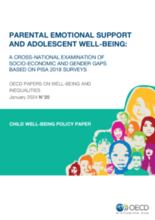This paper sheds light on within and between-country gaps in parental emotional support, as perceived by 15-years-old students surveyed in the 2018 Programme for International Student Assessment (PISA). It shows that within-country differences in parental emotional support, based on parents' education level and child gender, are largely explained by other characteristics such as family wealth, country of origin, and school urbanicity and private/public status. The paper also highlights that greater parental emotional support is associated with higher PISA test scores and greater subjective wellbeing outcomes. The findings suggest that a significant enhancement in parental support and related child outcomes can be sought, especially in countries with lower average levels of parental emotional support.

